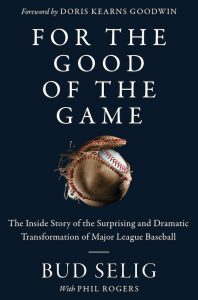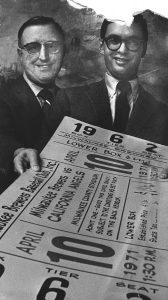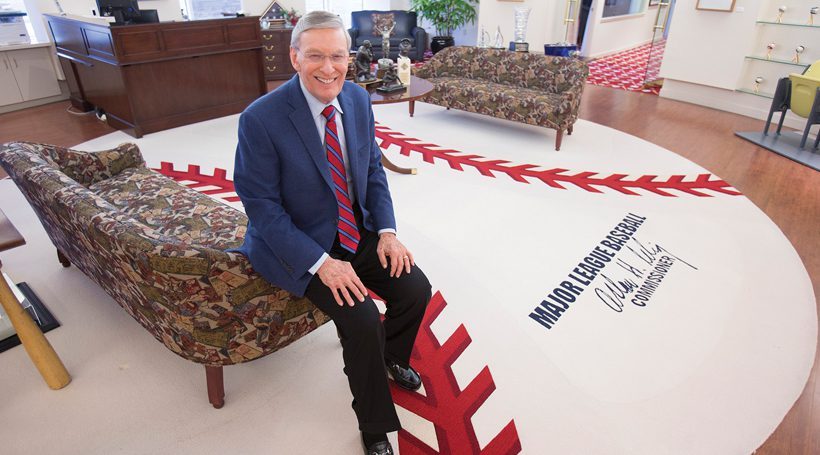Bud Selig faced no shortage of crises and controversies through 22 years as commissioner of baseball: The players’ strike that resulted in the cancellation of the 1994 World Series. The steroid epidemic that saw some of the sport’s biggest stars become pariahs and some of baseball’s most treasured home run records splashed with graffiti.
But Selig, 85, now serving as commissioner emeritus, is unapologetic. If he had to do it all over again, he’d do it the same way. Labor strife has given way to a quarter century of labor peace. Performance-enhancing drug hysteria has led to perhaps the most effective drug-testing regime in professional sports.
And he’s got the ultimate comeback to critics: a plaque in the Hall of Fame, awarded in December 2016 in his first year of eligibility.
 “I really don’t think I’d do anything different, and I’ve thought endlessly about it,” says Selig, who tells all about it in his new book “For the Good of the Game” and appears later this month at the Katz JCC Festival of Arts, Books and Culture. “I’m proud of all the changes – more in 22 years than there’d been in the history of baseball.”
“I really don’t think I’d do anything different, and I’ve thought endlessly about it,” says Selig, who tells all about it in his new book “For the Good of the Game” and appears later this month at the Katz JCC Festival of Arts, Books and Culture. “I’m proud of all the changes – more in 22 years than there’d been in the history of baseball.”
Selig fell in love with America’s pastime as a kid in Milwaukee. He was working at his father’s successful car dealership when his beloved Braves, the city’s first Major League Baseball (MLB) team, left for Atlanta in 1965. He made it his mission to bring baseball back, and eventually led a group of investors that purchased the Seattle Pilots in bankruptcy court for $10.8 million. The new owners renamed the team the Brewers, and moved them to Milwaukee five years after the Braves bolted.
As Brewer’s owner, Selig became active in the running of MLB. During his reign as the league’s 9th commissioner, the cancellation of the World Series is among the darkest times in baseball annals. To Selig, it was unavoidable. For decades, the owners had been a disorganized mess during negotiations with the players’ union, folding every time. Large-market owners wanted to spend however they wanted, while small-market owners wanted a share of revenues and to rein in spiraling salaries. During a 1993 owners’ summit, Yankees owner George Steinbrenner snapped and called his small-market brethren a bunch of “socialists.” But a year later, even Steinbrenner was onboard.
“I guess nobody had ever kept the owners unified, and frankly I did,” Selig says. “That’s one of the pieces that stunned [the players].”
It wasn’t one of Selig’s finest moments, but for sheer hilarity, mediation launched by President Bill Clinton after the Series cancellation provides a highlight in the book. The owners were ready to accept the mediator’s recommendations. But at a White House meeting, the players – and the Clinton administration itself – backed out of an earlier commitment to do likewise.
Selig says he had too much respect for the office of the president to blast Clinton to his face. But for some reason, he didn’t have that same issue with the office of the vice president. When Al Gore grumbled about being tired of complaints from small-market owners, Selig erupted.
“What did you just f—ing say to me?” Selig said. “You’re tired? You’re tired? You guys gave me your word!”
Some of MLB’s controversies had a distinct Philadelphia flavor. Although Pete Rose was banned from the game for betting on baseball as manager of the Cincinnati Reds – the team for which he had amassed the majority of his career record of 4,256 hits as a player – he’s treasured in the City of Brotherly Love. He’s considered the piece who gave a talented but snake-bitten Phillies team the boost of confidence and talent it needed to capture the franchise’s first World Series championship in 1980. Phillies icon Mike Schmidt, in particular, credits Rose for elevating his game.
In 2002, the Hall of Fame trio of Schmidt and two former Reds – Joe Morgan (who also helped the Phillies to a 1983 National League title) and Johnny Bench – brought Rose to Selig’s office in Milwaukee for what appeared to be his best chance at reinstatement. For Rose to be eligible for Hall of Fame voting, he needed first to be reinstated. The decision was his.
“Whatever Pete had done, they felt I should be talking to Pete and working it out,” Selig says. “They put no pressure on or anything. I was left to make my own decision, and I did.”
It turned out to be an easy call, Selig says. Rose politely said he felt the suspension was unfair, but then went on to deny gambling on baseball, despite the betting slips with his name on them detailed in the original investigative report. “He was just a compulsive liar, his own worst enemy,” Selig writes in his book. Later, Rose would release his own book and admit to betting on baseball.
Also in the 80s, Rose was part of what turned out to be a warm-up for the steroid scandal. (Selig was not the commissioner at the time but on the owners’ executive council.) Ex-Phillie Lonnie Smith testified in a drug-trafficking trial that Curtis Strong, a Phillies clubhouse caterer, had sold amphetamines to Rose, Larry Bowa, Greg Luzinski and numerous other major league players. Strong went to prison, but the allegations against the players went nowhere.
In the 1990s, rumors of steroid use milled about but were never taken seriously. Then in 1998, the tandem of St. Louis’ Mark McGwire and Chicago’s Sammy Sosa went on an unprecedented tag-team home run spree. McGwire was hailed as a hero upon smashing Roger Maris’ single-season home run record of 61, finishing with 70.
However, when a journalist spotted a bottle labeled androstenedione that August, the seeds of the steroid crisis started to sprout.

A gigantic ticket printed for opening day of the brewers 1971 season
Perhaps the Strong trial should have made baseball better prepared when the scandal broke, but Selig says initial disbelief about performance-enhancing drugs was universal and not unique to baseball leadership. It took time to study the issue, and when owners did decide testing was needed, they were blocked by the players’ union. It took a player revolt for the union to finally allow a pilot program in 2002. Today, there is an 80-game suspension for first-time steroid offenders.
“When I think of early criticism of the steroid era, no, we weren’t slow to react,” says Selig. “The union fought it. There’s no secret about it. That’s what people really don’t understand. If they couldn’t get a drug-testing program in the ’80s, they should’ve understood how difficult it was during the steroid era. That’s why I’m proud of where we are today.”
He may be proud, but he was in psychic pain in the summer of 2007. Barry Bonds, who came up as an outfielder with only moderate power, had emerged as a home run-hitting behemoth, setting a new record with 73 in 2001, and was now chasing down the all-time career mark of 755 set by Hank Aaron. There was little doubt that Bonds, who was caught up in a trial involving the sale of steroids to major leaguers, had used steroids. But he was never flagged on a test.
In his book, Selig says it was the right thing for him as commissioner to attend games as Bonds was about to catch Aaron. But he deeply disliked it. Aaron had been a friend of his ever since Selig sold him a car from his dealership in 1958, when Aaron was on the Braves in Milwaukee for 13 years before moving to Atlanta.
“There is plenty of blame to spread around in this sad chapter, and I’ll accept my share of the responsibility,” Selig writes. “We didn’t get the genie back in the bottle in time to protect Aaron’s legacy.”
Bud Selig will appear at the Katz JCC Festival of Arts, Books and Culture on Oct. 30. Get more information at katzjcc.org.














